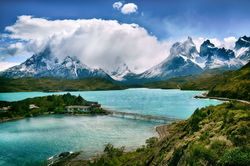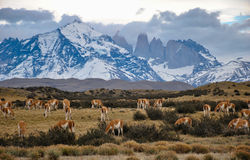
Overview
Chile is a extreamly long country that runs along South Amricas western boarder. The country is widely known for its diverse regional climate which has arounds 7 different climates per area of the country. Moreover, despite Chile's exceptional economy and good political system, they faced many challenges in history. Overall chile is a unique country that is very succesfull.
 Sun setting along a portion of the Andes mountains |  The beautiful city scape of Valparaiso on a sunny afternoon |  Sunny day in one of chiles most popular destinations, Torres del Pina National Park |  Group of many Dear ahead of a region known as Patagonia. This section is shared by both, Argentina and Chile |
|---|---|---|---|
 Blue sunny sky reflecting on Atacama's textured grounds |  A building in Chiles capital, Santiago standing alongside a mountain range during sunset |
History and Demographic's
The history of Chile dates back to the pre-colonial era when various Indigenous tribes founded the area in the mid-16th century. The Chincha, Quechua, Araucanian, and a fraction of the Inca empire inhabited Chile, each related in language. These civilizations lived by hunting, gathering, fishing, trading, and warring. In 1536, Spanish conquistadors led by Deigo Amarago (Francisco Pizzaro’s rival) were sent to invade Chile and they began by enslaving the indigenous peoples. Once the Spanish arrived, most indigenous peoples were killed by fighting, and smallpox. After the death of Amarago, Pizzaro permitted Pedro de Valdivia a license to conquer the country instead. Valdivia invaded in 1540 and the Spanish settled in Chile. Eventually, the settlers divided the land into small sections called The System of Estates. When Napoleon invaded Spain in 1808, the Spanish power in the viceroyalties was weakened, so Chile took action. In 1810, an open town meeting was held in Santiago, people got motivated again to overthrow the Spanish government.The Chileans chose Jose Miguel Carrera to be their leader. Life for Chileans in the area finally began improving. That was until the Battle of Ranconcaqua in 1814 when Spain attempted to regain control. After this devastating event, Brenardo O’Higgins along with the Carrea brothers, emigrated to Argentina. During that time, O’Higgins received support from Jose de San Martin and their army dominated the royalists on the hills of Chubaco and Santiago. However, independence was not declared until a year later in 1818, and not accepted by Spain until the late 1840s. Chile was free, though there was no leader. Both the Carrera brothers and Bernardo O’Higgins fought for power until the three brothers had been killed, leaving O’Higgins in full control over the county. However, he was forced to step down due to political conflict. From 1823 to 1830, there was an abrupt political split between the oligarchy and the army. By 1829, authorities with the help of the army gained control and nominated José Tomás de Ovalle as president, though Diego Portales held real power as a dictator. This led to a more organized government and economic growth. By 1879, Chile decided to participate in the War of the Pacific to have possession of the saltpeter mines. Three years later Chile had won the war. However, it weakened Chilean finances and worsened their economic situation. During the presidency of Jose Manuel Balmaceda, the government sought greater power, such as money from the saltpeter mines, and more power over financial matters. However, the oligarchy desired weaker government power. This conflict prompted a brief civil war that resulted in Balmaceda’s abdication from the presidency. Chile has had multiple ethnic groups that form many people in the country's identities, such as Europeans who arrived during Spanish colonization and indigenous people from tribes like the Atacameños, Diaguitas, and Picunches. Additionally, some Africans were brought to Chile as slaves during the colonial period. For these reasons, Chile's history and struggle for a functional country are crucial in understanding how the incredibly complex country came to be.
